calsfoundation@cals.org
Oren Harris (1903–1997)
Oren Harris served as prosecuting attorney of Arkansas’s Thirteenth Judicial Circuit (1937–1940) and in the U.S. House of Representatives, representing the Fourth Congressional District from 1941 to 1953 and, following redistricting, the Seventh Congressional District from 1953 to 1966. Harris resigned his congressional seat in February 1966 after President Lyndon Johnson appointed him U.S. district judge for the Eastern and Western Districts of Arkansas. Although Harris took senior status with the court in 1976, he fulfilled his promise to work until “he couldn’t put his socks on” and carried a full docket of cases for two additional decades.
Oren Harris was born on a farm in Belton (Hempstead County) on December 20, 1903, to Homer Harris and Bettie Bullock Harris, who were farmers. After completing high school at Prescott (Nevada County), Harris graduated from Henderson-Brown College in Arkadelphia (Clark County) in 1929 and received his law degree from Cumberland University Law School in Lebanon, Tennessee, in 1930. He financed his college education in part by picking peaches and playing semi-professional baseball. Before embarking on a political career, Harris practiced law in El Dorado (Union County) from 1930 until 1941. During this period, he served as deputy prosecuting attorney and prosecuting attorney of Arkansas’s Thirteenth Judicial District.
Harris married Ruth Ross on May 9, 1934, and they had two children.
Harris was elected to the U.S. House of Representatives in 1940, and he served in that chamber until 1966. He became chairman of the House Committee on Interstate and Foreign Commerce, the oldest continuous legislative committee in Congress, which dealt with legislation affecting commerce, communications, transportation, securities, petroleum, natural gas, and public health. Additionally, Harris directed the activities of four subcommittees, including the Special Subcommittee on Investigations, which captivated a nationwide audience during hearings on the Goldfine-Adams affair, rigged quiz shows, payola, and broadcast rating services. Major legislation introduced by Harris that was enacted into law included a bill providing for federal aid to health professions, designed to offset the growing shortage of health professionals, and various bills providing federal funds for states to build effective community programs dealing with mentally challenged individuals. Harris sponsored the Drug Efficacy Amendment of 1962, which required drug manufacturers to provide proof of the safety and effectiveness of their drugs prior to receiving Food and Drug Administration (FDA) approval and necessitated drug advertisers to disclose accurate information about side effects and efficacy of treatment. During his final term in the House, Harris introduced and sponsored the Drug Abuse Control Act, which required certain “stimulant, depressant, or hallucinogenic” drugs be designated as controlled, requiring licensing for sales and distribution.
After serving in the House of Representatives for more than twenty-five years, Oren Harris completed his public service career as federal judge for the Eastern and Western Districts of Arkansas. On July 26, 1965, President Lyndon Johnson nominated Harris to fill a newly created judicial seat. The Senate confirmed Harris on August 11, 1965, and he was sworn in on February 3, 1966. Harris assumed senior status with the court on February 3, 1976, but continued serving actively on the court until his health began to fail.
Harris was known as a man of strong convictions with great personal magnetism and ability. As a prosecutor, Harris developed an outstanding record that established him as one of the most successful and capable prosecutors of Arkansas’s Thirteenth Judicial District. In Congress, his peers recognized Harris as a forceful and dynamic speaker who advocated equal rights and opportunities for labor, a permanent soil conservation program, industrial development in the South, a permanent plan to eliminate unemployment, an agricultural program that raised living standards for farmers, the elimination of trade barriers and freight rate discrimination for the South, and balancing the federal budget without increasing taxes. Harris believed that America should avoid policies that might involve the nation in war but thought the country should maintain an army and navy capable of protecting the American people and their rights.
Although Harris became known as a fair and wise judge, he was not considered a strong supporter of civil rights. As a congressman, Harris joined Arkansas’s entire congressional delegation in signing the Southern Manifesto and voting against the Civil Rights Act of 1964. In 1975, the U.S. Eighth Circuit Court of Appeals in St. Louis overturned Harris’s 1973 decision exonerating International Paper Company at Pine Bluff (Jefferson County), the United Paperworkers’ International Union, and the International Brotherhood of Electrical Workers of implementing racial discrimination in their employment practices. The higher court returned the case to Harris for further review with specific instructions of how he should consider it.
Harris died of pneumonia on February 5, 1997, in Little Rock (Pulaski County) at age ninety-three. He is interred in Arlington Memorial Park in El Dorado.
For additional information:
Champagne, Anthony. “Oral History of Oren Harris.” Bonham, TX: Sam Rayburn Library and Museum, 1985.
“Court Overturns Harris Decision.” Arkansas Democrat. March 18, 1975, p. 6B.
Grele, Ronald J. “Oren Harris.” Oral history paper. Boston: John F. Kennedy Library, 1965.
Mulhollan, Paige E. “Oren Harris Oral History Interview.” Austin, TX: Lyndon B. Johnson Library, 1974.
Oren Harris Papers. Butler Center for Arkansas Studies. Central Arkansas Library System, Little Rock, Arkansas.
Oren Harris Papers. Special Collections. University of Arkansas Libraries, Fayetteville, Arkansas.
Ross, Frances. “Oral History Interview with Hon. Oren Harris.” St. Louis, MO: Circuit Library, U.S. Court of Appeals for the Eighth Circuit, 1987.
Sherry Laymon
Hot Springs National Park, Arkansas
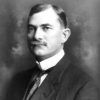
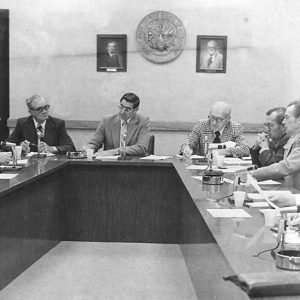
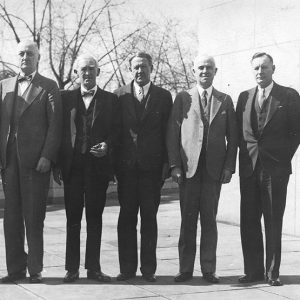
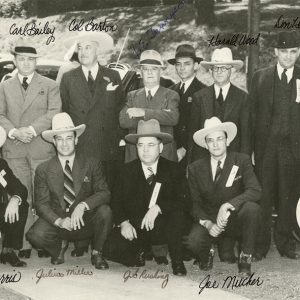
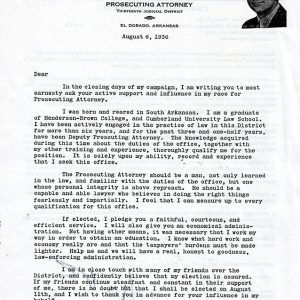
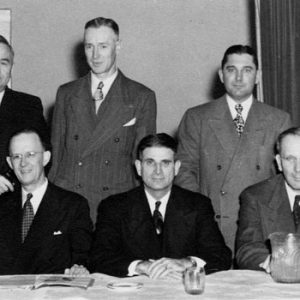
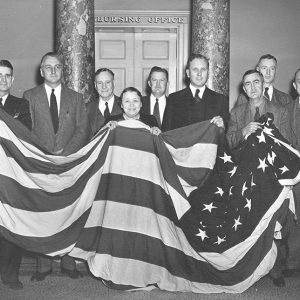




Comments
No comments on this entry yet.